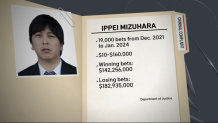A federal judge on Friday ordered the former longtime interpreter for Los Angeles Dodgers star Shohei Ohtani to undergo gambling addiction treatment in a sports betting case stemming from allegations he stole $16 million from the Japanese baseball player’s bank account to pay off debts.
Ippei Mizuhara exploited his personal and professional relationship with Ohtani to plunder millions from the two-way player’s account for years, prosecutors said, at times impersonating Ohtani to bankers.
Mizuhara only spoke on Friday to answer the judge’s questions, saying “yes” when the judge asked if he understood several parts of the case and his bond conditions.
Hours after court, his attorney Michael G. Freedman issued a statement saying Mizuhara hopes to “reach an agreement with the government to resolve this case as quickly as possible so that he can take responsibility.” He further added Mizuhara “wishes to apologize to Mr. Ohtani, the Dodgers, Major League Baseball, and his family.”
Get Tri-state area news delivered to your inbox.> Sign up for NBC New York's News Headlines newsletter.

Ohtani told the Los Angeles Times on Friday he was “very grateful for the Department of Justice’s investigation.”
“For me personally, this marks a break from this, and I’d like to focus on baseball,” he said from the field at Dodger Stadium ahead of the team’s game against the San Diego Padres.
MLB
Dodgers manager Dave Roberts said he was happy that Ohtani was exonerated and that everyone can move forward.
Roberts also said he had not seen the investigation affect Ohtani or anyone on the Dodgers.
“He’s handled it with flying colors. He’s done a great job of just focusing on playing baseball and not letting it be a distraction for him,” Roberts said. “Our guys, as well, have handled it really well as far as that noise and not letting it affect play.
“I think for us, we’ve already moved past it, to be quite honest with you. He addressed us earlier, we felt good about it and supported him. Nothing has changed.”
United States Magistrate Judge Maria A. Audero also ordered Mizuhara to be released on an unsecured $25,000 bond, colloquially known as a signature bond. That means that Mizuhara does not have to put up any cash or collateral to be released. If he violates the conditions of his bond, then he will be on the hook for $25,000.
Mizuhara turned himself in Friday ahead of his initial court appearance. He is charged with one count of bank fraud and faces up to 30 years in prison if convicted. Wearing a dark suit and a white collared shirt, he entered the courtroom with his ankles shackled, but was not handcuffed. The judge approved his attorney’s request to remove the shackles.
Freedman and the prosecutors declined to answer questions from the media outside the courthouse after the hearing concluded.
Other bond conditions stipulate that Mizuhara cannot gamble, either electronically or in-person, or go inside any gambling establishments, or associate with any known bookmakers.
Mizuhara is also prohibited from contacting any victim or witness in the case in any form. He is scheduled to be arraigned on May 9.
Freedman told the judge that his client already planned to undergo gambling addiction treatment.
The hearing lasted about 10 minutes inside a courtroom packed with press, much of it Japanese media.
The judge told Mizuhara to let her know if he did not understand any of the bond conditions as she read them.
Mizuhara was ordered to submit to drug testing and surrender his passport and remain within the Central District of California’s jurisdiction. The judge noted his family ties to the area, his longtime residency here and his self-surrender Friday morning when she approved the bond.
The judge also noted that Mizuhara does not have a criminal history.
Ohtani was not identified by name in the proceeding. Prosecutor Jeff Mitchell, in response to a question from the judge, only said “the victim has been notified.”
Prosecutors said there was no evidence that Ohtani was involved in or aware of Mizuhara’s gambling, and authorities said Ohtani is cooperating with investigators.
Mizuhara was not asked to enter a plea during Friday’s brief court appearance in downtown Los Angeles. A criminal complaint, filed Thursday, detailed the alleged scheme through evidence that included text messages, financial records and recordings of phone calls.
While Mizuhara’s winning bets totaled over $142 million, which he deposited in his own bank account and not Ohtani’s, his losing bets were around $183 million — a net loss of nearly $41 million.
In a message to his illegal bookmaker on March 20, the day the Los Angeles Times and ESPN broke the news of the federal investigation, Mizuhara wrote: “Technically I did steal from him. it’s all over for me.”
Major League Baseball opened its own investigation after the controversy surfaced, and the Dodgers immediately fired Mizuhara.



